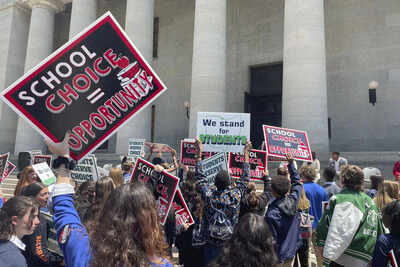Republican states expand school vouchers despite mounting concerns over their long-term cost

Republican-led states are rapidly expanding school voucher programmes even as warnings grow louder over their long-term financial sustainability. Across the nation, conservative lawmakers are advancing legislation to direct more public dollars toward private education, fueling a movement that critics say could destabilise state budgets and undermine public schools. The surge comes at a time of slowing revenue growth, dwindling federal pandemic aid, and increasing alarm over whether these sweeping initiatives are fiscally responsible over the long haul.
Texas and others lead ambitious voucher rollouts amid fiscal uncertainty
Texas became the latest flashpoint in the school choice debate after lawmakers approved a landmark $1 billion annual voucher programme, setting aside more than $10,000 per student to attend accredited private schools. While initially capped, state projections estimate costs could balloon to $4.5 billion annually by 2030—significantly outpacing early investments.
Elsewhere, Tennessee launched a $447 million plan, and although North Dakota’s proposed programme was vetoed, Republican leadership made clear that private education funding remains a legislative priority. These moves underscore a national trend: Even as state revenues tighten, conservative lawmakers are prioritising expansive school choice measures.
Costs escalate as universal eligibility broadens access
Until recently, voucher programmes were narrowly focused on low-income or special-needs students. That model has largely been abandoned. Today, Republican-majority legislatures are removing income restrictions, allowing virtually all families to access taxpayer-funded scholarships and savings accounts.
The financial ramifications are already visible. Florida’s voucher programme will cost nearly $3.9 billion this year, siphoning off roughly one out of every thirteen dollars from the state’s general fund. Arizona’s programme now consumes close to 5% of its general revenue. Analyses indicate that Iowa, Ohio, and Oklahoma are also seeing voucher costs swell to more than 3% of their annual budgets, threatening to squeeze other critical public services.
Economists warn that because many voucher recipients were already enrolled in private education before the subsidies, the programmes are driving up costs without significantly reducing public school burdens.
Public education faces growing budgetary pressures
As voucher programmes expand, traditional public schools are increasingly bearing the financial strain. In Ohio, recent budget proposals would deliver more funding increases to voucher programmes than to public schools beginning in 2026. Legislators also plan to claw back property taxes from districts, exacerbating resource gaps.
Public education advocates argue that with 90% of students still enrolled in public schools, diverting funds without adequately supporting the existing system will have serious consequences. Similar concerns are surfacing in North Carolina, where GOP lawmakers are boosting voucher funding while approving more modest salary increases for public school teachers than proposed by the governor.
Despite these tensions, efforts to scale back or pause voucher expansions—led mostly by Democratic governors and public education supporters—have struggled to gain traction in Republican-controlled legislatures.
National push intensifies as fiscal warnings mount
At the federal level, Congressional Republicans are advancing proposals to embed school choice initiatives into broader tax legislation. Proponents argue that such measures are crucial for educational freedom, but critics caution that voucher expansions will face stiff competition for funding against other Republican tax priorities, including cuts to Social Security benefits and overtime wages.
Analysts from nonpartisan think tanks warn that layering ambitious voucher initiatives onto existing fiscal obligations could destabilise long-term state and federal budgets. Without significant offsets or new revenue sources, funding both public schools and expansive private education subsidies may prove unsustainable.
Future of public funding at a crossroads
The Republican-led charge to expand school vouchers marks a defining moment in American education policy. Supporters hail the shift as a necessary correction to a rigid public education monopoly, offering families greater freedom to choose their children’s schooling. Yet critics warn that without careful fiscal stewardship, the surge in voucher spending could erode public education, exacerbate inequalities, and strain state finances for years to come.
As more states deepen their commitment to school choice—even amid growing warnings about costs—the battle lines are sharpening over what the future of education funding in America will look like. Whether the bold expansion of private school subsidies proves visionary or reckless remains an open question—one that states may soon have to answer under tightening fiscal realities.





